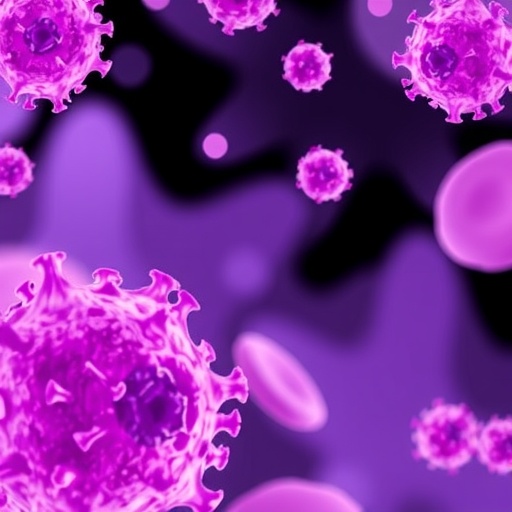In the rapidly evolving landscape of immunology, a remarkable population of immune cells known as gamma delta (γδ) T cells is gaining prominence, particularly in the context of solid organ transplantation. These unique T cells exhibit distinct characteristics compared to classical alpha beta (αβ) T cells, providing them with a specialized role in the immune response. Their capacity to recognize a broad array of antigens, including non-peptide molecules and stresses signals from damaged tissues, positions them as critical players in transplant scenarios. The recent study by Bigatti et al. shines a spotlight on the role of these cells in solid organ transplantation, and their findings could reshape therapeutic approaches aimed at improving transplant outcomes.
The significance of γδ T cells in transplantation lies in their potential to act as double-edged swords, both promoting graft tolerance and mediating rejection. Unlike their αβ counterparts that primarily recognize peptide fragments presented by Major Histocompatibility Complex (MHC) molecules, γδ T cells have a unique ability to identify stress-induced ligands on cells. This property allows them to contribute to both innate and adaptive immune responses, which poses an intriguing, albeit complex, challenge in the realm of transplantation. Understanding the nuances of their function is pivotal, as their activity could mean the difference between graft success and failure.
Recent advancements in the understanding of γδ T cells have revealed their involvement in various pathways related to immune regulation. For instance, they have been shown to secrete a variety of cytokines that can either stimulate or suppress other immune cells, thus influencing the overall immune environment in the context of a transplanted organ. Their versatility suggests that manipulating γδ T cells could provide innovative strategies to enhance graft acceptance, reduce the need for long-term immunosuppression, and ultimately improve patient outcomes.
One of the most compelling aspects of γδ T cells is their quick response capability. In the face of acute rejection episodes, these cells can rapidly proliferate and exert cytotoxic effects on target cells. This characteristic underscores their potential utility as early markers for transplant rejection. By studying the dynamics of γδ T cells post-transplant, researchers are hopeful that they can develop predictive models to identify rejection before it becomes clinically apparent, representing a paradigm shift in post-transplant monitoring.
The therapeutic implications of targeting γδ T cells in transplantation are vast. By harnessing their unique characteristics, it may be possible to create more personalized immunotherapy approaches tailored to individual transplant recipients. This is particularly pertinent given the variability in immune response among patients. Advances in biotechnology, such as CAR-T cell technology, could be adapted to γδ T cells, allowing for the development of engineered immune cells capable of selectively enhancing graft tolerance while minimizing rejection.
However, the journey toward integrating γδ T cells into routine clinical practice is fraught with challenges. One significant hurdle is the understanding of the specific subsets of γδ T cells and their differing functions in the transplant setting. The γδ T cell population is diverse, with various subsets exhibiting distinct roles. For instance, Vδ1 and Vδ2 subsets have been identified to play contrasting roles in immune responses. Elucidating these differences is essential for optimizing therapies aimed at manipulating these cells.
Furthermore, the microenvironment of the transplanted organ can significantly influence γδ T cell behavior. Factors such as donor-derived signals and the presence of certain cytokines can sway these cells toward a pro-inflammatory or regulatory phenotype. Thus, researchers must consider not only the intrinsic properties of γδ T cells but also the external signals that shape their responses within the transplant milieu.
Ethical considerations also emerge as a pivotal aspect of research involving γδ T cells in transplantation. As this field advances, ethical discussions surrounding the manipulation of immune responses must be at the forefront. Balancing the potential benefits of enhanced graft tolerance with the risks of unintended consequences, such as increased susceptibility to infections or malignancies, remains a critical component of developing any new therapies.
In conclusion, the exploration of γδ T cells in solid organ transplantation represents an exciting frontier in immunological research. As we augment our understanding of these remarkable immune cells, the potential to influence transplant outcomes becomes increasingly tangible. The findings from Bigatti et al. pave the way for further investigations into the therapeutic possibilities that exist within the realm of γδ T cells, emphasizing the need for continued collaboration between basic scientists and clinicians.
Looking forward, the implications of this work extend beyond transplantation alone. The unique properties of γδ T cells may hold keys to tackling other immunological challenges, such as autoimmune diseases or cancers. By digging deeper into the mechanisms governing γδ T cell functions, we not only improve transplant success rates but also potentially unveil new avenues for treating a variety of diseases linked to immune dysregulation.
As this exciting field matures, it will be crucial to integrate interdisciplinary approaches to harness the full potential of γδ T cells. With ongoing research, we anticipate a future where the manipulation of these cells becomes a cornerstone of transplant medicine, leading to better patient outcomes and paving the way for more effective therapies across a spectrum of inflammatory and immune-mediated diseases. The next few years will undoubtedly be transformative as more data emerge, guiding us toward valuable insights into the complex interplay of the immune system and transplantation.
Subject of Research: Gamma Delta T Cells in Solid Organ Transplantation
Article Title: Gamma Delta T Cells in Solid Organ Transplantation
Article References: Bigatti, C., Cocchini, L., Selbach, F. et al. Gamma Delta T Cells in Solid Organ Transplantation. Curr Transpl Rep 12, 15 (2025). https://doi.org/10.1007/s40472-025-00472-w
Image Credits: AI Generated
DOI: 10.1007/s40472-025-00472-w
Keywords: gamma delta T cells, solid organ transplantation, immune response, graft tolerance, immunotherapy, rejection, cytokines, Vδ1, Vδ2 subsets, immune modulation, transplantation outcomes, personalized medicine, ethical considerations.




